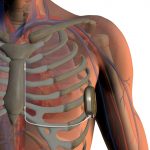 A few years ago I wrote about an interesting new wearable device that aimed to detect if the user is having a heart attack and will immediately call the emergency services.
A few years ago I wrote about an interesting new wearable device that aimed to detect if the user is having a heart attack and will immediately call the emergency services.
It’s along similar lines that a new innovation from Boston Scientific aims to attach a number of sensors to a defibrillator implant to make it possible to predict possible heart failures a whole month before they happen.
The researchers put the system through its paces in tests on 900 heart failure patients over the course of a year. Software was uploaded to the implanted defibrillator of each patient. The device is designed to give a small electric shock to the patient if their heart stops.
Spotting heart problems
The uploaded software allowed the devices to monitor the heart rate of the patient, alongside activity rates, heart sounds and even electrical activity in the chest itself.
Over the year long study period, the system was able to accurately detect 70% of the patients who suffered from heart failure. What’s even more interesting is that these predictions often came a month before the incident occurred.
“This is a new and clinically valuable measure of worsening heart failure, and it combines a number of measures of the physiology and heart failure, much like a doctor will look at a patient,” the researchers say. “Doctors look at all their signs and symptoms, get some tests, and put it all together and make a decision about how well or ill the patient is. HeartLogic does it similarly.”
“It integrates a number of measurements of what’s going on with the patient, including breathing, activity, and heart sounds, and puts that all together to give us an index that we believe is both sensitive and specific for heart failure.”
The idea is that heart attacks can be prevented before they occur by having more real-time data on the various things that contribute to such events. In many ways, it’s like monitoring blood sugar levels to help manage diabetes, as doctors and patients alike can monitor that for the kind of extremely high levels that often result in hospitalization.
The device will be piloted shortly, with intervention trials conducted to rigorously test it for safety levels and acceptance by both physicians and patients. It’s certainly an interesting concept however and one that’s well worth keeping an eye on.